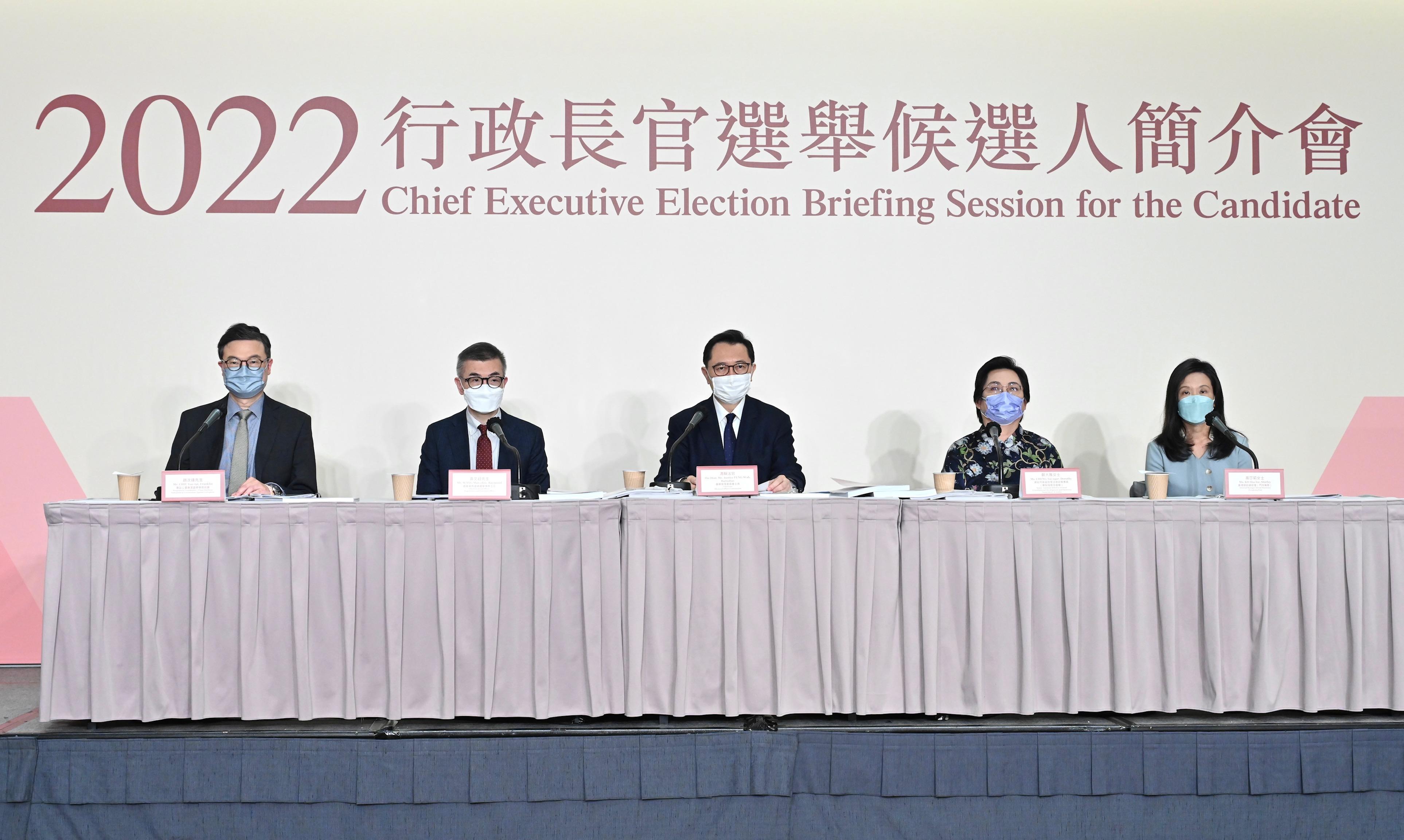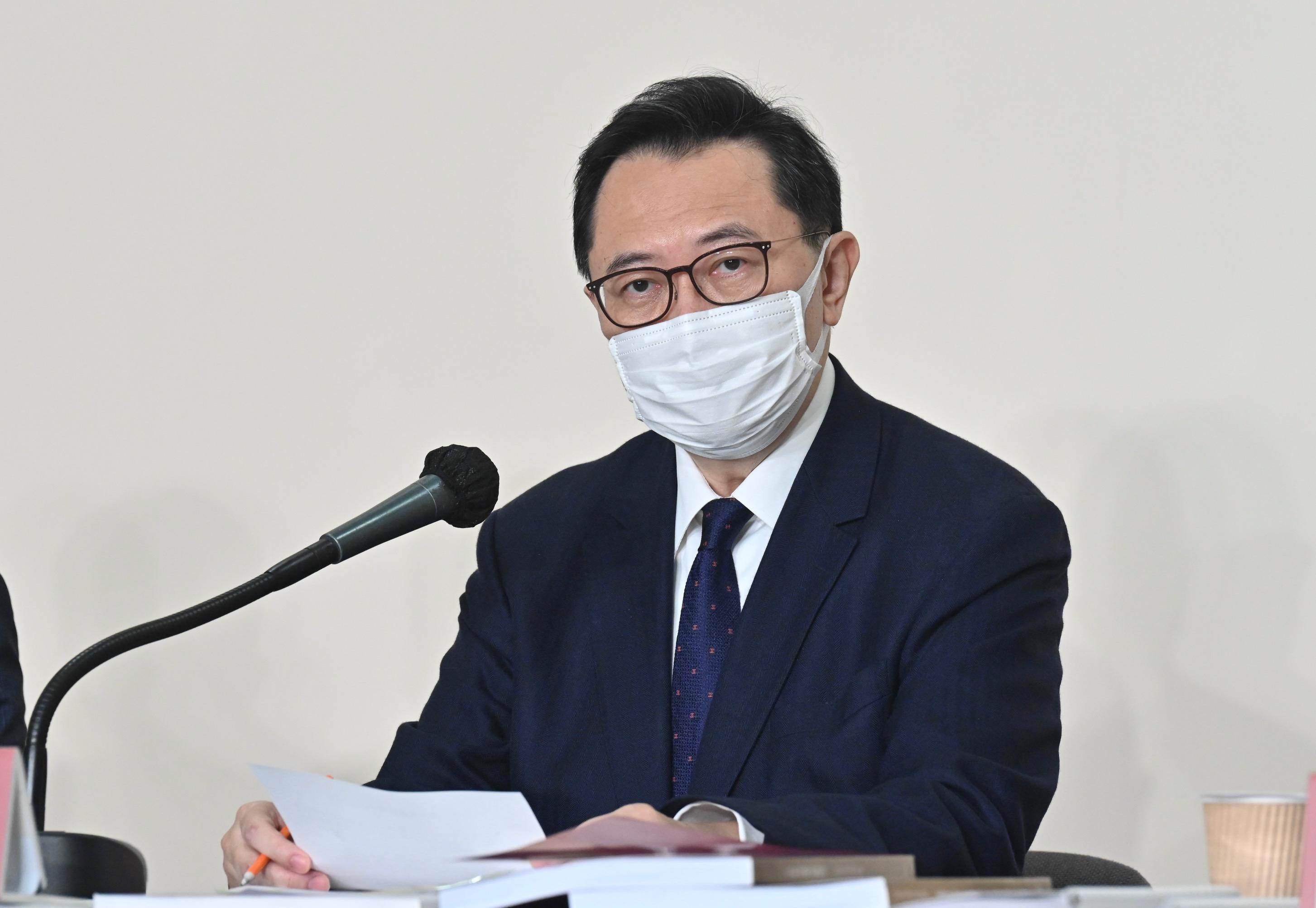EAC's online briefing on guidelines and legislation for 2022 Chief Executive Election (with photos/video)
******************************************************************************************
The Chairman of the Electoral Affairs Commission (EAC), Mr Justice Barnabas Fung Wah, briefed online the candidate of the 2022 Chief Executive (CE) Election and his electioneering team today (April 22) on important points to note in running the election campaign.
The nomination period for the sixth-term CE Election ended on April 16. The Returning Officer, Mr Justice Keith Yeung Kar-hung, received one nomination form from Mr John Lee Ka-chiu during the nomination period. The Candidate Eligibility Review Committee published a notice in the Gazette on April 18 to declare the nomination as valid.
Mr Justice Fung introduced the arrangements for polling and counting of votes in the election.
Polling stations and polling arrangements
The sixth-term CE Election will take place on May 8. The Registration and Electoral Office (REO) will set up a main polling station at the Hong Kong Convention and Exhibition Centre (HKCEC), Wan Chai, for the Election Committee (EC) members to cast their votes.
Mr Justice Fung said, "The law stipulates that a poll will be held in a contested election as well as in an uncontested election for the CE election. The CE shall be elected by the EC members by secret ballot on a one-person, one-vote basis. Only the members whose names are on the final register of the members of the EC may vote. There is only one validly nominated candidate in the election. Each EC member may cast either a 'support' vote or a 'not support' vote. The candidate shall be returned at the election if the number of valid 'support' votes obtained by him exceeds 750, and be appointed by the Central People's Government to become the next term of Chief Executive.
"However, if the number of valid 'support' votes obtained by the candidate does not exceed 750, the candidate shall not be returned at the election. The Returning Officer shall publicly declare that no candidate is returned at the election, and terminate the proceedings for the election. There will then be another round of nomination and election.
"Given the epidemic situation and to reduce the flow of people at the main polling station, the polling hours will be extended to two and a half hours, which are from 9am to 11.30am. A 'suggested timeslot' will be assigned to the EC members, according to the EC sectors to which they belong, to vote at the main polling station. Relevant information together with a polling notice will be sent to each EC member later. We call on the EC members to arrive at the main polling station to vote according to the suggested timeslots.
A polling notice and other electoral documents (including the Introduction to Candidate, the location map of the main polling station and details of the polling and counting procedures and voting instructions), will be sent by the REO about 10 days before the polling day to every EC member for their reference and use.
The Electronic Poll Register will be used for issuing ballot papers at the main polling station for the CE Election for more efficient and accurate issuance of ballot papers. The EC members only need to present the original of their Hong Kong permanent identity card or other specified alternative documents to the polling staff for collecting ballot papers.
At the briefing session, Mr Justice Fung emphasised that the ballot is secret and conducted in a confidential manner, and the EAC attaches great importance to voting secrecy.
He said, "Ballot papers will not be printed with numbers. Polling staff are prohibited from recording which particular ballot paper is issued to an elector. After being issued a ballot paper, the elector should proceed to a voting compartment alone and use the chop bearing the 'tick' mark provided at the polling station to vote. The elector should fold the ballot paper so that the marked side is inside, and then insert the folded ballot paper into the ballot box.
"Canvassing activities are forbidden inside polling stations. The EC members cannot show others the choice on his/her ballot paper. After leaving the polling station, the EC members have the right to decide whether to disclose their voting choice. It is an offence to disturb others, use electronic devices for communication, take photographs, or make video or audio recordings in the polling stations."
Measures in response to COVID-19
Facing COVID-19, the EAC will try its utmost to ensure EC members to exercise their right to vote. The REO will implement a number of measures to prevent the spread of the virus in the polling and counting stations. A fever detection system will be installed at multiple entrances of the HKCEC where the main polling station is located to conduct temperature checks on those who arrive at the main polling station. Electoral staff with fever symptoms will not be allowed to perform election duties. If the candidate or his agents have fever symptoms, they will not be permitted to enter the polling and counting stations, and he may assign other agents as replacements to monitor the polling and counting processes. The feverish EC members will be directed by polling staff to special voting compartments to vote. Special voting compartments will be thoroughly disinfected after each use.
Due to the increase in the number of EC members, anti-epidemic and social distancing requirements, there will be no less than 70 ballot paper issuing desks and about 100 voting compartments in the main polling station. The distance between the facilities in the polling and the counting stations will be widened as far as possible.
Mr Justice Fung said, "At present, there is no electoral law requiring electors to use the 'LeaveHomeSafe' mobile application before entering polling stations, but we encourage the EC members to use the 'LeaveHomeSafe' when entering the main polling station. The REO will post the 'LeaveHomeSafe' QR code of the main polling station at the passage leading to the main polling station in the HKCEC. However, whether the EC members use the 'LeaveHomeSafe' or not will not affect their voting rights. We also encourage the candidate and his agents to use the 'LeaveHomeSafe' when entering the main polling station. Besides, all polling staff will use the 'LeaveHomeSafe'.
"As for the counting station and its media centre, except the exempted persons (i.e. persons who are aged below 12 or aged 65 or above, and those with disabilities that render use of the 'LeaveHomeSafe' mobile application difficult), all entrants must use the 'LeaveHomeSafe'. The exempted persons are required to complete a record form to register their names, the first four digits or letters of their identification documents, their contact numbers and the date and time of their visits.
"Taking the current epidemic situation into account, the REO is closely liaising with the relevant bureaux or departments on detailed arrangements to allow EC members who are under quarantine or isolation on the polling day to vote. Details will be announced later."
The REO will continue to monitor closely the development of the epidemic, seek advice from the Food and Health Bureau and the Centre for Health Protection, make assessment and work out different plans based on the situation.
Counting arrangements and election result announcement
Once the poll is closed, the ballot boxes will be delivered to the central counting station at the HKCEC where the count will be conducted manually by counting staff. The candidate, his election agent and counting agents may observe the counting in the counting area, while members of the public can observe the counting in the public gallery. After the completion of the count, the Returning Officer will announce the election result at the central counting station. An announcement of the election result will be displayed outside the counting station and a Gazette notice will be published on the same day.
Mr Justice Fung also touched on the electoral laws and other provisions in the Guidelines on Election-related Activities.
Election expenses and election advertisements
Mr Justice Fung said, "Election expenses are regulated strictly by the electoral law in Hong Kong to ensure that they are within a reasonable level. The maximum amount of election expenses that can be incurred by a candidate in the CE election is $17.6 million. The Elections (Corrupt and Illegal Conduct) Ordinance (Cap. 554) stipulates that the aggregate amount of election expenses incurred must not exceed the maximum amount, and only the candidate and his authorised election expense agents could incur election expenses in relation to election advertisements.
"Anyone can express opinions about elections, but such opinions cannot be made into election advertisements, or else may be regarded as contravening the law."
The candidate is required to submit an election return to the REO not later than 60 days after the gazettal of the election result. The election return must set out all the election expenses incurred by the candidate or his authorised persons, and all electoral donations received which include free or discounted goods and services.
EC members' information
The REO has provided the candidate with mailing labels in respect of the EC members and the electronic files containing the Candidate Mailing Label System. Pursuant to the law, the relevant information can only be used for the purposes related to the electoral activities of the 2022 CE Election.
The candidate and his team should keep the personal information of the EC members carefully to prevent leakage. In addition, the candidate is required to properly destroy personal data of the EC members obtained from the REO within two weeks after the election.
Clean election
Pursuant to the law, it is an offence if a person uses force or duress against another person to affect his/her voting choice at the election. If any suspected illicit or non-compliance case is found, the EAC will refer it to law enforcement agencies for follow-up investigation and take appropriate action.
Elected candidate to declare not political party member
Pursuant to section 31 of the Chief Executive Election Ordinance (Cap. 569), the candidate who is declared as elected must make a statutory declaration that he is not a member of any political party, and lodge with the Returning Officer a written undertaking to the effect that he will not become a member of any political party or do any act that has the effect of subjecting himself to the discipline of any political party during his term of office as the Chief Executive, within seven working days after publication of the election result.
Information on the Chief Executive Election is available on the election website (www.elections.gov.hk).
Ends/Friday, April 22, 2022
Issued at HKT 19:20
Issued at HKT 19:20
NNNN
Photo
Audio / Video
EAC's online briefing on guidelines and legislation for 2022 Chief Executive Election






